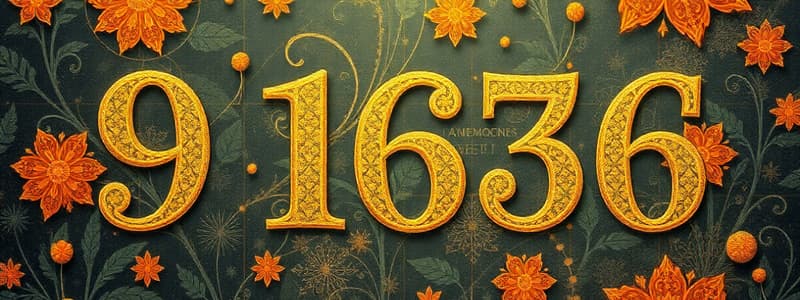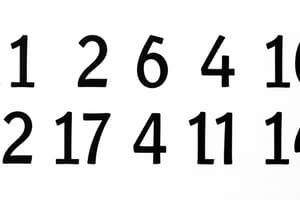Podcast
Questions and Answers
What is the additive inverse of -7?
What is the additive inverse of -7?
- -14
- 7 (correct)
- 0
- 7 + 7
Which of the following correctly verifies that –(–x) is the same as x?
Which of the following correctly verifies that –(–x) is the same as x?
- x = x + 0
- x = (-x) + 0
- 0 = -(-x) + x (correct)
- -(-x) + x = 0
If x = 13/17, what is the additive inverse of x?
If x = 13/17, what is the additive inverse of x?
- 13/17
- 0
- 17/13
- -13/17 (correct)
What does the expression 19 + (-19) equal?
What does the expression 19 + (-19) equal?
If x = -21/31, what is –x?
If x = -21/31, what is –x?
What operation does distributivity involve?
What operation does distributivity involve?
What result do you obtain by summing x and its additive inverse?
What result do you obtain by summing x and its additive inverse?
Which of the following statements is true regarding additive inverses?
Which of the following statements is true regarding additive inverses?
What is the additive identity for whole numbers?
What is the additive identity for whole numbers?
Which statement about the multiplicative identity is true?
Which statement about the multiplicative identity is true?
Which of the following is a property of the negative of a number?
Which of the following is a property of the negative of a number?
What is the negative of -3?
What is the negative of -3?
If a rational number is represented as a, which of the following expresses the property of multiplicative identity?
If a rational number is represented as a, which of the following expresses the property of multiplicative identity?
What is the sum of 5 and -5?
What is the sum of 5 and -5?
What is the result of multiplying -4 by 1?
What is the result of multiplying -4 by 1?
If a integer is represented by a, which expresses the relationship between a and its negative?
If a integer is represented by a, which expresses the relationship between a and its negative?
What is the result of multiplying an integer by another integer?
What is the result of multiplying an integer by another integer?
Which of the following statements about division of integers is true?
Which of the following statements about division of integers is true?
Which of the following is a rational number?
Which of the following is a rational number?
Are rational numbers closed under addition?
Are rational numbers closed under addition?
Which of the following expressions results in a rational number?
Which of the following expressions results in a rational number?
What is the result of adding two rational numbers?
What is the result of adding two rational numbers?
Which of these reflects a misconception about integers and division?
Which of these reflects a misconception about integers and division?
Which of the following statements is false regarding rational numbers?
Which of the following statements is false regarding rational numbers?
What is the first step to finding rational numbers between two fractions?
What is the first step to finding rational numbers between two fractions?
Which of the following is a rational number between -2 and 0?
Which of the following is a rational number between -2 and 0?
How many rational numbers can be found between -5 and 5?
How many rational numbers can be found between -5 and 5?
What is the result of converting -5 and 6 into fractions with a common denominator of 24?
What is the result of converting -5 and 6 into fractions with a common denominator of 24?
Which of these numbers is the mean of 1 and 2?
Which of these numbers is the mean of 1 and 2?
Which statement correctly describes rational numbers?
Which statement correctly describes rational numbers?
What is an example of a rational number between 6 and 8?
What is an example of a rational number between 6 and 8?
From the given rational numbers, which is not between -2 and 0?
From the given rational numbers, which is not between -2 and 0?
What is true about whole numbers?
What is true about whole numbers?
Which statement about integers is accurate?
Which statement about integers is accurate?
What defines rational numbers on the number line?
What defines rational numbers on the number line?
What is the value of the point that is one third between 0 and 1 on the number line?
What is the value of the point that is one third between 0 and 1 on the number line?
If the point halfway between 0 and 1 is $\frac{1}{2}$, what is the point that is two thirds from 0 towards 1?
If the point halfway between 0 and 1 is $\frac{1}{2}$, what is the point that is two thirds from 0 towards 1?
Which of the following represents the first mark after 1 on the number line shown?
Which of the following represents the first mark after 1 on the number line shown?
How should the label be determined for the second point dividing the space between 0 and 1 into three parts?
How should the label be determined for the second point dividing the space between 0 and 1 into three parts?
What can be said about the relationship between the points $\frac{1}{2}$ and $\frac{1}{3}$ on the number line?
What can be said about the relationship between the points $\frac{1}{2}$ and $\frac{1}{3}$ on the number line?
Flashcards are hidden until you start studying
Study Notes
Numbers and Operations
- Integers and Multiplication: Multiplying any two integers results in another integer (e.g., 5 × (–8) = –40).
- Closure Properties:
- Whole numbers are closed under addition and multiplication but not subtraction and division.
- Integers are closed under addition, subtraction, and multiplication but not division.
Rational Numbers
- Definition: A rational number can be expressed as a fraction p/q, where p and q are integers, and q ≠ 0. Examples include –2, 4, 2/3, and –5/7.
- Closure Under Addition: The sum of any two rational numbers is a rational number (validated through various addition examples).
- Closure Under Subtraction: The difference between two rational numbers is also a rational number (validated through subtraction examples).
Distributive Property
- The distributive property allows splitting a product into sums or differences (e.g., a(b + c) = ab + ac).
Additive Inverse
- The additive inverse of a number a is –a, such that a + (–a) = 0. Example:
- The additive inverse of –7 is 7.
- For 19, the additive inverse is –19.
Identity Elements
- Additive Identity: Zero (0) serves as the additive identity for rational numbers, integers, and whole numbers (a + 0 = a).
- Multiplicative Identity: One (1) is the multiplicative identity for rational numbers; multiplying a rational number by 1 yields the same number (a × 1 = a).
Negative Numbers
- The negative of a number a is defined as –a, making it the additive inverse of a. For example, if a = 2, then –2 is the negative.
Rational Numbers on Number Line
- Rational numbers can occupy positions between integers on the number line, making them dense. For instance, between –1 and 0, and between 0 and 1, there are infinite rational numbers.
Finding Rational Numbers
- Express whole or fractional ranges with a common denominator to identify rational numbers in between. For example:
- To find numbers between –2 and 0, convert them to fractions (–20/10 and 0/10) and identify values such as –19/10, –18/10, etc.
Examples of Rational Numbers
- Example of rational numbers between –5 and 5 might include –19/24, –18/24, up to 14/24 when listed with a common denominator of 24.
Conclusion
- Rational numbers encompass a robust framework where operations like addition, subtraction, and multiplication maintain closure, while the concept of additive inverses and identifying dense numbers on the number line plays a critical role in understanding their properties.
Studying That Suits You
Use AI to generate personalized quizzes and flashcards to suit your learning preferences.




